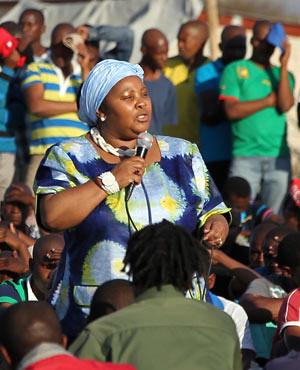
South African Minister of Defense Nosiviwe Mapisa-Nqakula speaking to striking miners in Marikana on August 21, 2012. The government apologized for the killing of 34 miners the previous week., a photo by Pan-African News Wire File Photos on Flickr.
ANC slams British for Marikana crisis
Tuesday, 18 September 2012 00:00
South African City Press
JOHANNESBURG — ANC leaders have blamed British media, “populism and mavericks” — such as expelled ANC Youth League leader Julius Malema — for the ongoing violence in Marikana and surrounding mines.
But members of the party’s national executive committee (NEC), the party’s highest decision-making body between conferences, at its meeting in Pretoria this weekend differed over whether party infighting was also partly to blame.
The ANC’s national working committee (NWC) warned in a report tabled at the meeting by party secretary general Gwede Mantashe that “Marikana” has become interchangeable with the governing party’s leadership battles ahead of its elective conference in Mangaung.
The report said Marikana is held up as evidence of why the party should replace its leaders.
A source who attended the meeting and who wants to see Deputy President Kgalema Motlanthe replace President Jacob Zuma, said former defence minister Siphiwe Nyanda and Western Cape secretary Songezo Mjongile questioned how Mantashe “could equate everything that happened with Mangaung”.
They argued the on-going violence at Marikana, where police shot dead 34 protesters after 10 people were murdered in the days before “confirmed there is a vacuum of leadership”.
They also criticised the indirect call to charge Malema for encouraging workers from other mines to strike.
“If the police go and arrest Julius Malema for illegal gatherings, that instruction would have come from Luthuli House [the ANC’s headquarters] and that is a problem because the police must decide on the basis of facts,” the source said.
He also said Defence Minister Nosiviwe Mapisa-Nqakula, who last week slammed Malema as a counter-revolutionary for meeting with soldiers, “broke ranks” by saying the ANC and government should apologise for the deaths at Marikana.
Mapisa-Nqakula, who is seen to be a Zuma supporter, said “you can’t kill so many people and think it is normal. We ourselves were shocked”.
In the report the ANC complained the party and state institutions, were “deliberately being delegitimised”.
To repair the likely damage to a relationship between the ANC and mine workers, the party proposed “more political work” be done in mining communities.
In the report, the NWC had the following to say about the individuals and organisations it believes are behind the crisis at Marikana: “The emphasis on Lonmin being a British mining company derives from the British media’s offensive on the South African government without even mentioning the role of, or (role) supposed to be played by, the employer.
“This narrow approach has created space for resentment against black South Africans, wherein minority shareholders who happen to be black get blamed as having the sole responsibility in the company.”
“The prominence of the destructive role played by populism and mavericks points to the possibility of the creation of liberated zones for counter-revolution and connection of the zone into a Renamo-type movement.”
Renamo, the Mozambican National Resistance, is a political party in Mozambique that started as a rebel movement fighting Robert Mugabe’s Zanu-PF and Frelimo (the Liberation Front of Mozambique) during the Mozambican civil war.
“The Marikana tragedy has been exploited by many forces, among them Malema and the Friends of the Youth League, opposition parties, a section of the clergy and some within structures of the ANC.”
“The name of Marikana is being used interchangeably with that of Mangaung. It is now being explained as evidence of a weak leadership that must be changed in Mangaung.
“The problem is not lobbying for preferred candidates in the 53rd national conference, but the readiness with which we are prepared to bleed the ANC to death for narrow, short-term interests.”
“Those opposed to the ANC will stop at nothing to destroy it. It is, however, more dangerous when the factions in our movement would also stop at nothing to destroy the ANC if in the short term ‘our faction’ wins. — City Press.
No comments:
Post a Comment